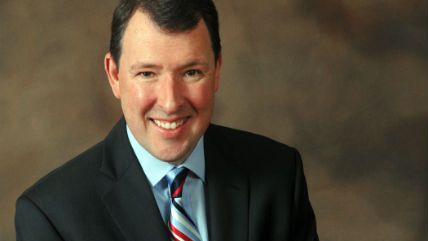Trump-Hating Bush Speechwriter Attacks Libertarians for Being Soft on Drugs
'Jesse Helms was right about Bill Weld,' Marc Thiessen writes for AEI, inaccurately, without disclosing that he was Helms's spokesman at the time.


Marc Thiessen, former speechwriter for George W. Bush and Donald Rumsfeld, and current Washington Post columnist and American Enterprise Institute resident fellow, is so repulsed by Donald Trump's lack of moral fitness for the White House that he recently analogized voting for the Republican to pulling the lever on a runaway train to save five innocent nuns but kill a beloved family member in the process (no really, he did). Thiessen has called Trump a 9/11 "truther" and a liberal pretending to be conservative, and made jokes after Trump sealed the GOP nomination about going to Canada.
So what's a proud member of the Trump-hating conservative establishment to do? Why, slam Libertarian vice presidential nominee William Weld for being soft on drugs!
Over at the AEIdeas blog, Thiessen has written a post with the headline "Jesse Helms was right about Bill Weld." In it, the columnist recounts—accurately—that the former Senate Foreign Relations Committee Chairman opposed the then-Massachusetts governor's 1997 nomination as U.S. ambassador to Mexico largely on grounds of what Thiessen characterizes as "Weld's abysmal record on drugs." That record included supporting medical marijuana and needle-exchange programs for heroin addicts, as well as (in Helms's view) obtaining too few drug convictions during his stint as U.S. attorney.
Such a record, then or now, is anything but "abysmal." Half of U.S. states currently allow medical marijuana, three out of four Americans think medicinal pot should be legalized, and more importantly, they're right: It is neither wise nor conservative to put law enforcement between individual adults and their non-lethal medicine. As for needle-exchange programs, there is substantial evidence that they reduce the spread of such blood-transmitted diseases as HIV/AIDS.

What's more, Thiessen's preferred prohibitionism has been particularly godawful for Mexico. The Mexican Drug War, which somehow raged despite the world dodging the bullet of a Weld ambassadorship, has killed scores of thousands of people. About the only U.S. policy shown to have affected the behavior of the Mexican drug cartels is—wait for it—legalizing marijuana. And don't just take libertarians' word for it; here's a headline from Thiessen's own newspaper: "Legal marijuana is finally doing what the drug war couldn't." You can find similar coverage in such non-hippie venues as The Daily Caller, Breitbart.com, and, uh, Partnership for Drug Free Kids.
Thiessen goes on to quote from articles showing that Weld has had his mind changed by Gary Johnson in favor of legalizing recreational pot, and then concludes, "Jesse Helms was right."
But why go after the obviously less-enthusiastic drug legalizer on a Libertarian ticket headed by a former cannabis company CEO? Probably because of a wee little fact that the author left out of his prohibitionist rant: Marc Thiessen, you see, remembers the Helms-Weld spat particularly well, because back then he was the spokesman for Jesse Helms.
Thiessen was mad, then as now, that Weld waved off Helms's drug-policy objections as a smokescreen for broader "ideological extortion" over abortion, gay rights, and other social issues. ''Weld is using his appointment as a tool to start an intra-party battle for the soul of the Republican Party," Thiessen complained to The New York Times back then. "And he's using Jesse Helms as his foil. That's an abuse of the confirmation process, and an abuse of the U.S. Senate.'' Some contemporaneous accounts support Thiessen's interpretation.
But even if Thiessen was 100 percent right on tactics and tact, he continues to be 100 percent wrong on the underlying policy dispute. Weld's "record on drugs makes him unqualified for the post," he told the L.A. Times in 1997. Now, nearly two decades and 100,000 Mexican drug-war deaths later, Thiessen would rather settle old parliamentary scores and dissuade people from entertaining an alternative choice to this "train wreck" (his words) of a presidential election, than admit that he's dead wrong.


Show Comments (84)